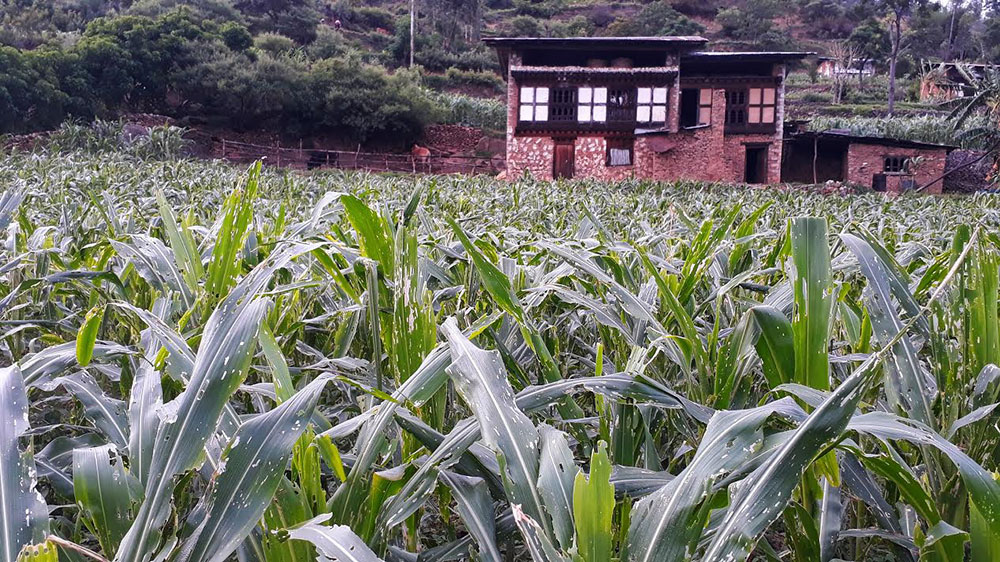… farmers grow desperate for lack of lasting solutions
Ugyen Dorji
The maize harvest in Tsirang for this year is over. Farmers battled hard against the invasion of Fall Armyworm and could save much of their crops.
Farmers said that the fight was not over. At least not yet given the lack of an effective pest control mechanism.
Fall Armyworms have been invading fields in Tsirang and other farms across the country every year. Agriculture officials and researchers have been trying to help through various means. However, the impact of these efforts has been limited, farmers said.
Most farmers use the conventional method of controlling the fall armyworm by clearing the boundaries around their fields, regularly monitoring crops, improving soil fertility, altering the sowing dates to create unfavourable conditions for the pest, and practising crop rotations.
Agriculture officials recommend farmers monitor the pest build-up, spray the pesticides and set pheromone traps.
National Plant Protection Centre (NPPC) has been monitoring pest incidents and cautioning farmers of outbreaks. The centre carried out four low-toxic insecticides after the pesticides the centre provided were found ineffective in controlling the pests.
An official from the agriculture department said that they briefed farmers on pest control.
Agriculture Minister Yeshi Penjor said that although numerous measures have been taken the government prioritised resolving the pest issues.
“Farmers are spraying the pesticide on the maize leaves when it rains and the pesticide is washed away and it is not working,” he said.
Farmers, he said, are encouraged to use the spray guns but many cannot afford them.
“Though the army worms die after spraying the pesticides, the genes are left and it can damage the crops due to increase in temperature. So it is good if the farmer burns out their field after harvesting their crops,” lyonpo said.
However, if even one farmer does not burn the infected plants, it will not help to mitigate the pests and the worms will recur. “So the permanent method to overcome the pest problems is to burn the fields.”
A lecturer of the College of Natural Resources (CNR), Ongpo Lepcha, recommends quarantining the plants and a relevant authority should strictly monitor the import of plants.
“If regulatory measures are not taken while importing plant and plant products, eggs and young ones of many pests can be easily introduced here,” said the lecturer who studied the worm in his Master’s degree.
He said that the pest problem can also be managed by either preponing or postponing the sowing dates from the actual sowing dates.
However, implementing this method requires a good understanding of the agro-ecosystem of the area.
If the nutrient is managed well in the crops, the worm-affected maize can still grow and give a certain yield. However, one should avoid nitrogen fertilizers like Urea as they can make plants more susceptible to pests, said Ongpo Lepcha.
NPPC’s Senior Plant Protection Officer Tsheltrim Zangpo said that the centre will conduct research in the next maize season and will introduce the new pesticides.
He said that they will evaluate maize varieties against the worm and monitor its population using sex pheromone traps in four Chukha, Lhuentse, Mongar, and Sarpang. “With this, we can use pesticides at the correct time.”
The NPPC has not conducted research on the effect of FAW on food production (maize) though. In FY 2023-2024, NPPC plans to conduct damage assessment on maize production.
Lyonpo said that although there are many policies and Acts, they are not properly implemented.
The minister said that to overcome the pest problem all stakeholders should work together. “The pests are emerging due to climate change and it is very important to implement the policies and rules in the pest-prone area and confront the pests.”
If serious measures are not taken on time, the pest-related problems will have implications on the country’s food security in the long run, Lyonpo said.


